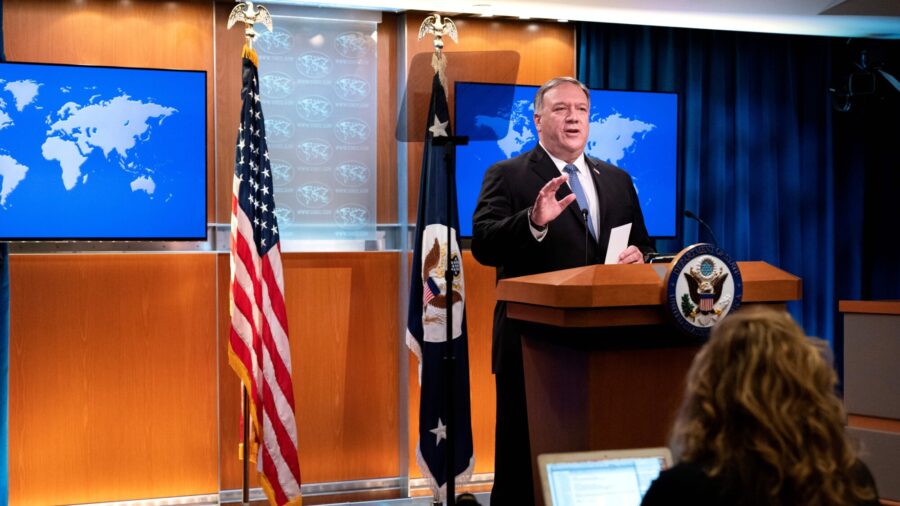As President Joe Biden was sworn into office, the Chinese Communist Party (CCP) announced sanctions on former Trump administration officials, including former Secretary of State Mike Pompeo and former national security adviser Robert O’Brien, in response to their tough-on-China policies.
The move came a day after Pompeo declared the CCP’s repression of Uyghur Muslims in the Xinjiang region a “genocide.”
The Chinese regime sanctioned 28 people on Jan. 20. A foreign ministry spokesperson accused them of “seriously violated China’s sovereignty,” adding that they were “responsible” for “a series of crazy moves” which “seriously disrupted China-U.S. relations.”
Among those sanctioned are high-level officials in former President Donald Trump’s administration, including Pompeo; O’Brien; former White House trade adviser Peter Navarro; former deputy national security adviser Matthew Pottinger; former Secretary of Health and Human Services Alex Azar; former U.S. Ambassador to the U.N. Kelly Craft; David Stilwell, former assistant state secretary for the Bureau of East Asian and Pacific Affairs; and Keith Krach, former undersecretary of state for economic growth, energy, and the environment.
John Bolton, Trump’s previous national security adviser, and Stephen Bannon, who previously served as Trump’s White House chief strategist, were also sanctioned.
Those sanctioned and their immediate family members are barred from entering mainland China, Hong Kong, and Macau, according to the spokesperson. The individuals and “companies and institutions associated” with them will also be restricted from doing business with China, the statement added.
The former U.S. officials sanctioned were involved in the Trump administration’s response to threats posed by the CCP. These include sanctions on CCP officials for rights abuses in Xinjiang and Hong Kong, banning U.S. investments into Chinese companies with ties to the military, and convincing allies to shut out Chinese telecom giant from 5G networks around the world over national security threats.
Azar and Krach last year visited Taiwan, becoming the highest-level U.S. officials to visit since the United States switched formal relations from Taiwan to China in 1979. Craft was also due to visit the island last week but ended up speaking to Taiwan President Tsai Ing-wen via teleconference instead when it was canceled due to transition efforts. The high-level visits, as well as the Trump administration’s increased engagement and arms sales to the democratic island, angered Beijing, which views Taiwan as part of its territory.
In one of his final acts as secretary of state, Pompeo declared that the regime has committed “genocide and crimes against humanity” against Uyghurs and other Muslim minorities in the far-western Xinjiang region. Biden’s pick for secretary of state, Antony Blinken, told a Senate hearing on Tuesday that he agreed with the designation.
The CCP’s repression in the region, perpetrated through its network of internment camps and mass surveillance system, has drawn international condemnation. However, Beijing, which denies the atrocities, lashed out at Pompeo during a foreign ministry press briefing on Wednesday, calling him a “doomsday clown,” while describing the designation as a “piece of wastepaper.”
From The Epoch Times


